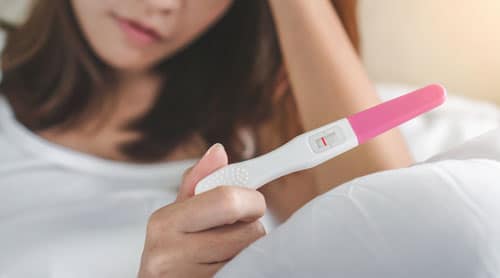Infertility is defined as the inability to conceive after having sex without using birth control for one year. Approximately 90 percent of couples will conceive within twelve months of trying; however, ten percent of women in America have difficulty getting pregnant or staying pregnant. Infertility is shrouded in mystery; however, there are some common causes of infertility and what you can do to increase your chances of getting pregnant.
Pregnancy Rates
Did you know that the rate of pregnancy per ovulation cycle is a mere 15 to 20 percent? At first glance, this seems like very low odds of becoming pregnant; however, over the period of a year, the rate of achieving pregnancy increases to approximately 90 percent. There are several things that can reduce the odds of becoming pregnant, including blocked fallopian tubes, irregular periods, and low sperm counts.
Conception Challenges

Ovulation Schedule
Determining when to have unprotected intercourse to maximize the odds of becoming pregnant is not an exact science. The window of fertility occurs approximately 6 days before ovulation. Women who have a regular menstrual cycle can determine their fertility window using an ovulation calendar. If the woman has an irregular cycle, a home ovulation test kit along with temperature reading can help determine her fertility window.
Many individuals think that frequent ejaculation can lower fertility rates in men; however, this is a misconception. Abstaining from intercourse can actually increase a man’s stress levels and interfere with sperm production. Additionally, when using lubricants, choose one that does not lower sperm motility.
Common Causes of Infertility

- Age – The quality of a woman’s eggs begins to decline with age, which makes conception difficult and the risk of miscarriage increases. Although there is nothing you can do to change your age, there are several things you can do to increase your odds of becoming pregnant.
- Smoking – Cigarette smoking can damage the cervix, fallopian tubes, and ovaries. Smoking can also deplete eggs prematurely and increase the risk of ectopic pregnancy or miscarriage. If you smoke, try to stop smoking. Smoking not only affects fertility, but it can damage the health of a fetus.
- Hormone Imbalances – A hormonal imbalance is one of the common reasons for infertility. Hormones are used throughout the body to regulate a variety of processes including ovulation. A hormonal imbalance can disrupt ovulation, prevent a pregnancy from becoming established, or prevent the uterine lining from thickening. Fortunately, once a hormone imbalance is discovered, it can be corrected using bioidentical hormones, dietary changes, or lifestyle changes, of a combination of these three.
- Weight – Being significantly underweight or overweight can affect ovulation. Maintaining a healthy body weight can increase the odds of becoming pregnant. Eat a healthy diet and follow a moderate exercise program.
- Alcohol – Alcohol can affect a couple’s ability to become pregnant. Limit alcoholic beverages to no more than one drink per day. Furthermore, any amount of alcohol can damage a fetus. Therefore it is best to avoid alcohol entirely if you are trying to get pregnant.
- Caffeine consumption – Did you know that drinking more than two cups of coffee or other caffeinated beverages can increase the risk of infertility? Limit caffeine consumption to improve fertility.
- Stress – Psychological stress can increase the risk of infertility. There are numerous stress reduction techniques that can help decrease your stress and improve the chance of getting pregnant.
- Sexually Transmitted Diseases – Sexually transmitted diseases like gonorrhea or chlamydia can damage a woman’s fallopian tubes. Limit sexual partners and have your physician check to ensure you have no sexually transmitted diseases.
A woman’s health is a priority when it comes to ovulation and fertility. Women must fulfill many different roles in her life. They are busy with their careers, caring for their homes, and taking care of their families. Unfortunately, that leaves little time for a woman to care for herself. Add on the stress of trying to get pregnant, and it creates a stress-filled life that further exacerbates infertility issues.
How Can We Help?
The integrative professionals specialize in women’s health issues including hormone imbalances, uterine fibroids, polycystic ovary syndrome, and infertility. Our functional medicine practitioners will work with you to determine the causes of infertility and develop a customized plan that addresses the things that are decreasing your odds of becoming pregnant.

















